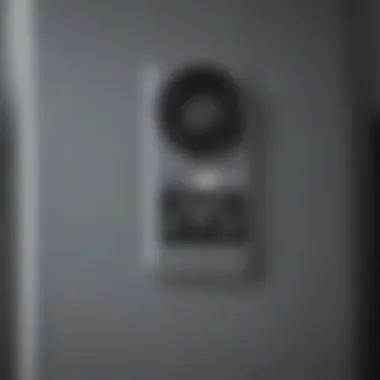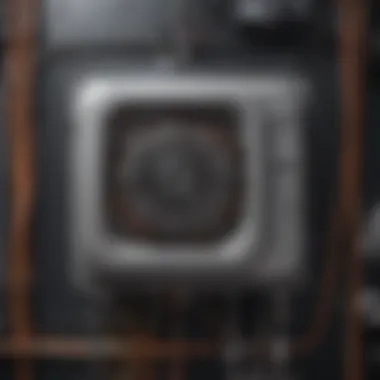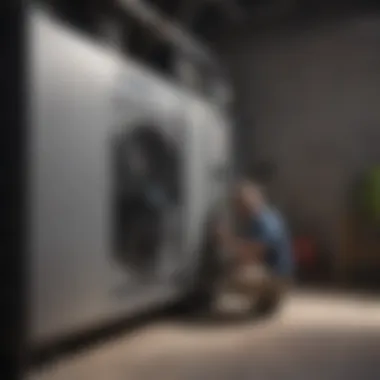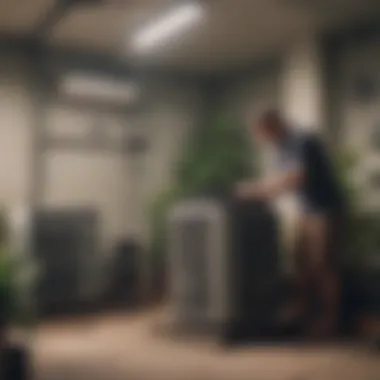Understanding AC Issues: Why It's Blowing Warm Air


Intro
Experiencing air blowing from your air conditioning unit but feeling no cooling can be frustrating. This situation is not uncommon, yet understanding the underlying causes is essential for every homeowner. An effective air conditioning system plays a significant role in maintaining a comfortable living environment, especially during the hotter months. Exploring the specific issues that lead to insufficient cooling helps empower homeowners to diagnose problems and seek appropriate solutions.
In this article, we will investigate the various reasons why your AC might be failing to cool the air, from refrigerant issues to possible electrical faults and maintenance oversights. Each section aims to provide clarity on these aspects so readers can take informed, actionable steps to rectify the situation. Let’s examine the potential causes that could be impacting the performance of your air conditioning unit.
Prelims to the Problem
Understanding why an air conditioning unit blows air but fails to cool effectively is crucial for homeowners. This problem often leads to discomfort and can escalate energy costs. Moreover, recognizing the symptoms and potential causes can mitigate prolonged periods of inadequate cooling. Addressing these issues early can lead to timely repairs or adjustments, saving both money and effort in the long run.
Understanding Air Conditioning Basics
An air conditioning system operates on principles of thermodynamics, circulating refrigerant to absorb heat from your home and release it outside. The key components of an AC include the compressor, condenser, evaporator, and expansion valve. Each part has a specific role, and the failure of one affects the entire unit's performance.
The compressor pumps refrigerant throughout the system. The evaporator coil extracts heat from indoor air, which cools the air that then gets circulated back into the house. Understanding these fundamentals is necessary to grasp why issues, such as a lack of cooling, may arise.
Common Symptoms of AC Issues
Homeowners should be vigilant for certain signs indicating AC troubles. Common symptoms include:
- Weak Airflow: When the air blowing from the vents is weak, it may signal a blockage or malfunction.
- Humidity: High indoor humidity levels can indicate insufficient cooling.
- Strange Noises: Clicking or grinding noises may suggest mechanical issues.
- Unusual Smells: Foul odors can arise from electrical shorts or mold.
- Inconsistent Temperatures: Rooms may feel very different in temperature, indicating airflow or balance issues.
Recognizing these symptoms early helps in diagnosing the problem efficiently. By remaining aware of the signs and the basic operation of your air conditioning system, you can make informed decisions regarding maintenance and repairs.
Potential Causes of Insufficient Cooling
Understanding the Potential Causes of Insufficient Cooling is crucial for homeowners who rely heavily on air conditioning systems. When the AC blows air but does not cool, it can be frustrating and confusing. Each of the factors outlined below significantly impacts the performance of cooling systems. Identifying the cause is the first step toward resolution, which can save time, energy, and maintenance costs. This section covers a variety of issues that could prevent your AC from functioning optimally, giving you a clear path for troubleshooting and repair.
Refrigerant Level Problems
Understanding Refrigerant Function
The refrigerant is the heart of an air conditioning system. It absorbs heat from the indoor air, making it cool before sending it back into your living space. This fluid cycles through the system, shifting from liquid to gas and back again; effectively transferring heat outside. A key characteristic of refrigerant is that it should remain at a consistent level. Low levels indicate possible leaks, which not only reduce efficiency but can also damage the compressor over time. It is vital to ensure appropriate refrigerant levels to maintain optimal cooling performance.
Signs of Low Refrigerant
Low refrigerant levels can lead to several symptoms. One primary sign is a decrease in cooling efficiency; your AC may blow warmer air. Unusual patterns, like ice forming on the evaporator coil, also suggest refrigerant problems. Recognizing these signs early can help prevent more severe issues down the line, such as compressor failure. Homeowners should monitor their AC's performance and be alert to these warning signs for swift action.
Faulty Compressor
Role of the Compressor in Cooling
The compressor acts much like a pump. It pressurizes refrigerant and circulates it throughout the system. This action is vital for cooling because it aids in heat exchange. If the compressor is not working correctly, the AC cannot efficiently cool the air. A faulty compressor can endure excessive wear quickly, leading to high repair or replacement costs. Understanding this role is crucial when diagnosing an AC that is not cooling properly.


Recognizing Compressor Issues
Signs that indicate compressor issues include strange noises, a failure to turn on, or an overheated unit. Such symptoms can vary in intensity, but they all signify that immediate attention is necessary. Regular monitoring of the compressor’s performance will aid in catching problems early, preventing extensive damage. Homeowners should be aware of these issues to avoid inconvenient breakdowns during peak usage times.
Electrical Failures
Common Electrical Issues
Electrical components play a significant role in the performance of air conditioning units. Common issues may include blown fuses, tripped breakers, or faulty wiring. These problems may prevent the unit from starting or lead to erratic functioning. Understanding how these electrical issues arise is vital for proper AC maintenance and troubleshooting.
Impact on AC Performance
The electrical failures can drastically impact your AC's performance. Faulty wiring may cause shorts that lead to overheating, while blown fuses can halt operation altogether. Ignoring electrical issues can lead to more severe damages and higher repair costs. Ensuring your AC's electrical components are in good condition is essential for consistent cooling and efficiency.
Clogged Air Filters
How Filters Affect Airflow
Air filters help maintain indoor air quality. When filters are clogged, airflow is restricted, which significantly impacts the AC’s cooling capability. The key feature here is that regular filter replacement is necessary to keep air flowing freely. A dirty filter reduces efficiency, forcing the system to work harder and potentially leading to breakdowns.
Maintenance Tips to Prevent Clogs
To avoid clogged filters, homeowners should consider a few maintenance practices. First, check and change the air filter according to manufacturer recommendations. It may be beneficial to set up a schedule to replace filters every one to three months. Additionally, regular cleaning of vents can improve airflow and enhance system efficiency. Staying proactive can help maintain optimal performance over time.
Thermostat Malfunctions
Importance of Accurate Thermostat Readings
Thermostats regulate the air conditioning system’s operation. Accurate readings are essential for appropriate cooling. If a thermostat malfunctions, it can send incorrect signals to the AC, resulting in improper operation. Regular checks of thermostat settings and functionality can avoid this issue.
Troubleshooting Thermostat Issues
Common issues with thermostats include incorrect temperature readings or failure to respond. Homeowners should check battery levels or recalibrate the device if necessary. If problems persist, consulting an HVAC professional may be advisable. Understanding thermostat functionality can greatly influence your AC's cooling effectiveness.
Ductwork Problems
Identifying Duct Leaks
Ductwork carries cooled air throughout a home. If there are leaks or blockages, it can cause substantial inefficiencies. Key traits to watch for include inconsistent temperatures between rooms or increased energy bills. Identifying leaks can help homeowners rectify airflow issues before they escalate.
Importance of Duct Maintenance
Regular duct maintenance is crucial to ensure efficient air delivery. This includes sealing leaks, cleaning ducts, and checking for proper insulation. Duct maintenance not only keeps the AC functioning more effectively but also enhances indoor air quality. Homeowners investing in duct care often see improved overall system performance.
Blocked Condenser Unit


Consequences of Blockage
The condenser unit plays a vital role in expelling heat outside. A blockage can severely hinder this process, leading to overheating and reduced cooling performance. Recognizing signs of blockage, like limited airflow or excessive noise, is essential for timely maintenance.
How to Clear the Condenser
Clearing the condenser involves removing debris such as leaves, dirt, or other obstructive materials. Homeowners should check the unit regularly, especially during periods of high use. Keeping the area around the condenser clean will optimize performance and prolong the life of the cooling system.
Troubleshooting Your AC
Troubleshooting your air conditioning system is a crucial step when you face the issue of your AC blowing air but not cooling adequately. Understanding how to systematically check various components can save time and money. By identifying potential issues early, you can minimize costly repairs or total system failures. Furthermore, it ensures you make informed decisions regarding your cooling system. This process encourages homeowner involvement in their own system's maintenance by providing a clear pathway to resolving issues.
Initial Checks to Perform
Before calling a professional, it is worth performing some basic checks. Start by turning off the AC unit and checking the thermostat settings. Make sure it is set to cooling mode and the temperature is lower than the current room temperature. A wrong setting here can mislead you into thinking there is a significant problem.
Next, inspect your air filters. Clogged filters restrict airflow and impede the unit's ability to cool effectively. If the filters appear dirty, change them with new ones. Dirty filters can lead to bigger issues down the line.
Also, take a look at your outdoor condenser unit. Ensure it is free from any debris, such as leaves or branches, that might block airflow. A clear path around the unit allows for efficient operation. Check for visible leaks in the ductwork as well. Minor air leaks could lead to the system working harder, ultimately reducing its cooling efficiency.
When to Call a Professional
There are times when it is advisable to seek help from a qualified technician. Ignoring complicated issues can turn into costly repairs later. Here are some key indicators that it might be time to reach out for professional assistance.
Signs of a Serious Problem
Some signs indicate significant issues requiring professional attention. If your AC unit is making unusual noises, such as grinding or rattling sounds, it could signal an internal malfunction. These noises suggest problems with internal components, and ignoring them could lead to complete system breakdown.
Additionally, persistent warm air blowing from your vents despite adjustments signifies a deeper problem, be it refrigerant issues or a malfunctioning compressor.
Another alarming sign is visible leakage of fluid around the unit, indicating potential refrigerant leaks or other system failures. These problems not only affect cooling efficiency but can also lead to hazardous situations. Thus, noting these signs is crucial in preventing worsening conditions.
Choosing the Right HVAC Technician
Selecting the right HVAC technician plays a vital role in addressing your AC issues. Look for professionals who have both certification and ample experience in the field. Proper credentials ensure that the technician understands your specific problem thoroughly.
One key feature of the hiring process is checking online reviews and testimonials. Many homeowners share their experiences, providing insight into the quality of work performed by the technician. Consider technicians who provide detailed estimates before beginning any work; this practice shows professionalism and respect for your budget.
Lastly, ensure that the technician is knowledgeable about your specific AC model and its systems. Trying to solve problems without specialized knowledge can lead to further issues, ultimately diminishing efficiency. Ultimately, selecting a qualified professional can lead to proper diagnostics and effective repairs, restoring your air conditioning system's optimal performance.
Preventative Maintenance Strategies
Preventative maintenance strategies are crucial for ensuring the optimal performance of air conditioning systems. Many homeowners overlook the importance of regular checks, believing that their AC units will operate efficiently without much intervention. However, consistent maintenance is essential to avoid common issues, like blowing air without cooling. Implementing effective strategies can enhance system longevity and efficiency, ultimately saving money on energy bills and repairs.


Regular Filter Replacements
One of the simplest yet most impactful maintenance tasks is regular filter replacements. Air filters trap dust, pollen, and other particles. Over time, these filters get clogged, restricting airflow and making the AC work harder. This not only leads to inefficient cooling but also puts extra strain on the unit, potentially causing breakdowns.
Benefits of Regular Filter Changes:
- Improved Air Quality: Clean filters lead to better indoor air quality.
- Energy Efficiency: A clean filter can improve system efficiency, reducing energy consumption.
- Extended Lifespan: Regularly changing filters can increase the lifespan of your AC.
Recommendation: Homeowners should check filters monthly and replace them at least every three months. If you have pets or allergies, consider changing the filters more frequently.
Annual AC Servicing
Annual servicing is another key component of preventative maintenance. During a professional service, technicians inspect the AC system, check refrigerant levels, and perform necessary adjustments. Regular servicing not only identifies potential issues early but also maintains efficiency.
Key Aspects of Annual Servicing:
- Comprehensive Inspections: Technicians can detect underlying problems that may lead to significant issues later.
- Cleaning Coils: Dirty coils can affect the cooling capability. Regular cleaning helps maintain peak performance.
- System Calibration: Technicians ensure that the system is functioning according to the manufacturer's specifications.
It is advisable to schedule service before the cooling season to ensure efficiency during high-demand months.
Monitoring System Performance
Monitoring system performance allows homeowners to keep track of how well their air conditioning unit is functioning. This requires being attentive to changes in cooling capability and operating sounds. Understanding basic performance indicators helps in identifying problems early.
How to Monitor Performance:
- Listen for Unusual Noises: Grinding or rattling sounds may indicate mechanical issues.
- Check Temperature Output: Ensure that the air coming from vents is cool enough compared to the air indoors.
- Observe Energy Bills: A sudden spike in energy bills may suggest that the system is working harder, possibly due to inefficiencies.
Regular monitoring empowers homeowners to act quickly, minimizing the risk of costly repairs and inefficiencies that stem from neglect.
Epilogue
In this article, we have explored the common issue of air conditioning units that blow air but do not cool effectively. Understanding the reasons behind this problem is crucial for homeowners. When an air conditioning system fails to provide proper cooling, it can lead to discomfort and higher energy bills. Therefore, recognizing the key causes can facilitate timely intervention and repairs.
Summary of Key Points
Several factors can contribute to inefficient cooling in your AC system. These include:
- Refrigerant level problems: It is vital to monitor refrigerant levels, as low levels can significantly affect overall performance.
- Faulty compressor: The compressor's role in cycle is to circulate refrigerant. Without it functioning correctly, cooling is compromised.
- Electrical failures: Issues like blown fuses or faulty wiring can halt your system from operating effectively.
- Clogged air filters: Filters block airflow, limiting the system's ability to cool air efficiently. Regular maintenance is key.
- Thermostat malfunctions: A malfunctioning thermostat might send incorrect signals to your system, leading to cooling issues.
- Ductwork problems: Leaks or blockages in ducts can prevent cool air from reaching intended spaces. Regular checks can reveal these faults.
- Blocked condenser unit: Any obstruction around the outside unit prevents efficient heat dissipation, impairing the cooling function.
Encouragement for Timely Maintenance
Timely maintenance of your air conditioning unit is not just a recommendation; it is essential for optimal performance. Homeowners should establish a routine maintenance plan that includes
- Regular filter replacements
- Annual servicing by a professional technician
- Continuous monitoring of system performance
By implementing these maintenance strategies, homeowners can ensure their air conditioning systems operate at maximum efficiency, ultimately enhancing comfort levels and reducing long-term costs. Regular upkeep often identifies potential issues early on, preventing more severe failures and costly repairs.
"An ounce of prevention is worth a pound of cure."
In summary, understanding why your AC might blow air but not cool is vital. By grasping the implications of these issues and acting promptly, homeowners will be better equipped to enjoy a comfortable living environment.



